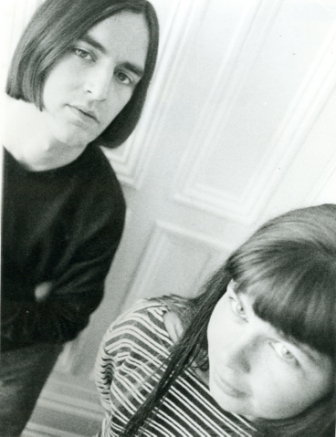Within the pages of Shakey: Neil Young’s Biography, the exhausting yet thorough testament to Canada’s most revered and famous classic rocker, author Jim McDonough dedicates an entire chapter to the story behind Young’s 1975 album, Tonight’s the Night. Unlike Harvest, Young’s well-polished and most popular album, Tonight’s the Night was a loose, sleazy, and haggard affair exposing the darker side of Young’s then-troubled and grieving times. Written and recorded after the drug-related deaths of CSNY roadie Bruce Berry and Crazy Horse guitarist Danny Whitten, Tonight’s the Night bares Young’s disdain for commercial success and the alternative means for escape (namely, drugs and booze).
In more ways than one, Tonight’s the Night has set the paradigm for fellow Canadians Ladyhawk. On the Vancouver-based band’s self-titled debut album, released earlier this year on Jagjaguwar, they make rambling, heavily distorted, rough-around-the-edges guitar rock that is sensitive, loud, and passionate. The lyrics tug at the heartstrings, reminisce about past loves, and cope with certain struggles and faults that sink deep. It’s an earnest look into the psyche of the band, comprised of singer and guitarist Duffy Driediger, lead guitarist Darcy Hancock, bassist Sean Hawryluk, and drummer Ryan Peters, all of whom grew up together in Kelowna, a prominently religious midsized city secluded in central British Columbia.
“There wasn’t a lot for kids to do, so we had to find our own fun,” says 26-year-old Hancock. “You just had to think hard, unless you wanted to sit in front of a 7-Eleven all day.”
Although all four were friends growing up, it wasn’t until 2004 that they all played together as a band, in part because the members had been separated for a number of years. Peters was the first to move to Vancouver, followed by Driediger, Hancock, and Hawryluk, respectively. Like many midsized cities, Kelowna has that sort of inescapable vortex that can suck you back into it. “My friends were telling me I’d get stuck there, so I moved.” says Hancock, who relocated to Vancouver in 1999.
Once in Vancouver, Hancock began playing in bands like the Metic and Dru, and later hooked up with Peters. The two played together in the melodic post-rock band the Mennonites, which was comprised of three Mennonites (Peters included) and Hancock, who was raised Catholic. Driediger honed his skills with God of Science and the Retreaters, while Hawryluk was mainly playing in hardcore and punk bands. When Driediger needed a backup band for a couple shows in Vancouver, Ladyhawk was born.
Strange. A group of Canadians from somewhat varying musical backgrounds come together and make one of the year’s best Southern-rock-flavored records? But when citing their various influences, the rootsy vibe of the record seems natural. “I’ve always listened to Silkworm,” says Hancock. “Duffy listens to Neil Young, Grateful Dead, Bob Dylan. . . . I don’t know which one is the most obvious.”
Obvious or not, you can hear elements of Hancock’s obsession with Silkworm on Ladyhawk. There is a stop-and-go pace on “Advice” and “Sad Eyes/Blue Eyes,” which one minute brings the tempo to a mellow calm that explodes the next into melodically wanky guitar solos and crashing percussion. The band’s single “The Dugout” harkens back to a time when the fellows were dating some girls who lived near a baseball field, and the hooky chorus is brilliant. “So tell me the truth of your heart, please tell me, please tell me!/I’m locked in the basement again, turn your light on, turn your light on me.”
Regardless, Neil Young’s influence is prevalent throughout, most notably on darker, more depressing numbers like “New Joker,” “Sad Eyes/Blue Eyes,” and “Long ’til the Morning,” which, at over seven minutes, could very well be Ladyhawk’s take on “Cortez the Killer.”
Ladyhawk’s new material, which has been dubbed the “Mushroom Sessions” and has been circulating on the Internet, takes the band even more into the similar intoxicated realm as Young’s Tonight’s the Night. Over the period of a few nights, the band laid down unrehearsed tracks each member had written, all while under the influence of mushrooms. “We went in, did mushrooms, and really liked the outcome,” says Hancock. “We discovered that mushrooms can be fun again. We hadn’t done them in so long.”
Of course, not all went according to plan. “There’s a lot of obnoxious things that we ended up editing out once we were sober.”






